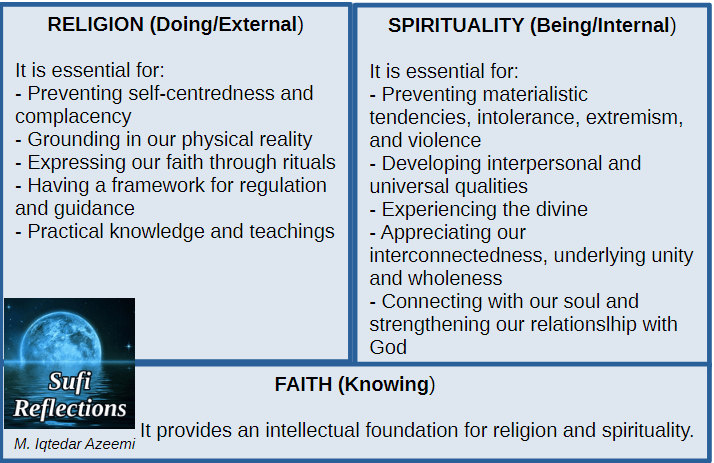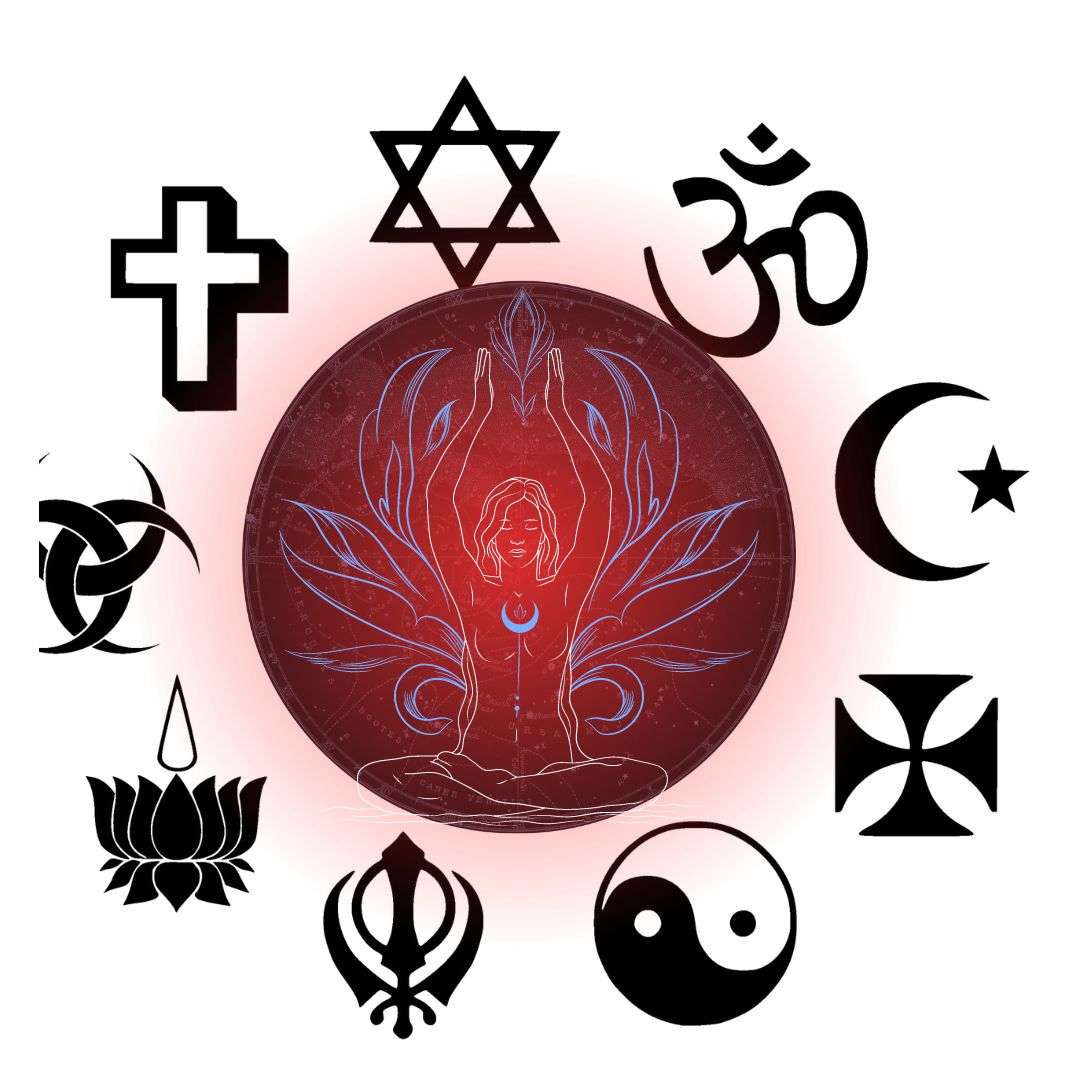Contents
Understand the Spirituality and Religion:
A common impression nowadays is that following a certain religion involves merely having faith in its claims, affirming its beliefs, adhering to its teachings or dogma, performing its prescribed rituals, and participating in its ceremonies and celebrations. Most people have become detached or divorced from the more personal, experiential, or spiritual dimension of religion. People’s connection with their souls and God and the embodiment of many moral virtues were largely weakened until the current spiritual reawakening.
Spirituality is concerned with more interpersonal and universal qualities, such as forgiveness, compassion, and love. It immerses us in our natural harmony, interconnectedness, and wholeness. Religion without spirituality is focused exclusively on material or practical aspects of life, especially rules, laws, and rituals.
The loss of morality and spirituality aligned with the encroachment of egoism, materialism, and empirical thinking over the past several centuries, which humanity fell into. It was characteristic of this dark (kali yuga or jahilliyah) age, while it had a stronghold that spirituality was relegated, disregarded, and even opposed.
I will show that not only is spirituality very much part of religion but also that both are essential and how the two complement each other. For example, in the Abrahamic religions:
- Judaism has a spiritual dimension in the form of the Merkavah mystics, the Essenes, the Kabbala, and the Chassidic movement. They encourage people to develop a deep and intimate relationship with God. This is different from orthodox Judaism with its focus on halakha (religious laws and customs). Spirituality was denied by the Sadducees, Haskalah, and in the conservative and reform movements.
- Christianity is essentially a spiritual faith despite being corrupted by the Roman empire and marred by a history of crusades and extremists. Hermetics and gnostics flourished in the first few centuries to liberate people from materiality and its emphasis on a personal relationship with God through gnosis. A significant change to strip Christianity of spirituality came about when they were persecuted and after the Council of Nicaea redefined the religion in 325 CE.
- Islam formally identifies three dimensions of the religion as a deen (way of life): Islām(with its focus on the shariah, rituals, and other basic aspects), imān (faith and beliefs), and ihsān. The latter is the spiritual dimension, now more commonly called ‘tasawwuf’ (Islamic spirituality or Sufism). The Wahhabi or Neo-Salafi movement has tried to oppose this since the 18th century. Difference between spirituality and religion
Difference between spiritual and religious
In this graph, GodsYou clearly shows the difference between spiritual and religious. It highlights how spirituality’s search for transcendence contrasts with religion’s collective adherence to concepts by contrasting their essence, beliefs, structures, practices, and authorities. While spirituality fosters inner growth and flexible interpretation, religion emphasizes tradition, dogma, and community cohesion, elucidating their divergent paths to the divine.
| Aspect | Spirituality | Religion |
|---|---|---|
| Definition | Personal connection to the divine or | A personal connection to the divine or |
| salvation, and adherence to moral codes. | and practices shared by a community. | |
| Beliefs | Focuses on individual beliefs and | Adheres to established doctrines and |
| experiences. | teachings of a particular faith. | |
| Structure | Often fluid and flexible, with | Typically organized with hierarchies, |
| no formal structure or institution. | clergy, and formalized rituals. | |
| Practices | Meditation, mindfulness, personal | Worship, prayer, sacraments, |
| growth, seeking inner peace. | religious ceremonies, rituals. | |
| Authority | Personal experience, intuition, | Religious texts, clergy, religious |
| and inner guidance. | authorities, traditions. | |
| Dogma | Emphasis on individual interpretation | Emphasis on adherence to prescribed |
| and understanding of truth. | beliefs and teachings. | |
| Community | Can be solitary or involve | Involves belonging to a community |
| participation in spiritual groups | of believers with shared beliefs. | |
| Flexibility | salvation, and adhere to moral codes. | Can be rigid, with adherence to |
| beliefs and experiences. | established doctrines and practices. | |
| Purpose | Seek personal growth, inner peace, | Fulfill religious duties, attain |
| and connection to the divine. | salvation, adhere to moral codes. | |
| Focus | Inner journey, self-discovery, | Worship, obedience, community |
| and transcendence. | cohesion, moral guidance. |
Spirituality:
Spirituality is not, therefore, something alien to religion at all; rather, it is an essential and integral part of it in its pure, original, and comprehensive form. However, the materialistic aspects dominated over time, and people generally disengaged from the more devotional side of religion except for the few spiritually inclined ones. The spiritual dimension is more pronounced in Eastern religions in general, but followers of those religions have also succumbed to extremism in recent times.
It is manifested, for example, in the form of the Hindutva movement among Hindus and Buddhist extremism in Myanmar. So, extremist and other debasing, intolerant, non-spiritual elements have left no religion untainted. But the misinterpretation, misuse, and exploitation of religion is the fault of certain deluded, anti-social, and spiritually devoid followers.
Human imperfections and weaknesses are to blame. It is neither supported in holy scriptures nor the essence of any true religion, which aims to strengthen people’s relationship with God, not to dissociate from God. As the Buddha once said, “The finger pointing at the moon is not the moon”.
Some people today claim to be “spiritual but not religious”. Spirituality without religion is an equally dangerous venture. Spirituality without religiosity can lead to self-centredness, complacency, and even materialistic tendencies, which are antithetical to real spirituality. The lack of proper grounding and protection, a framework for regulation and guidance, makes one vulnerable to influences by negative unseen entities. It also makes them more prone to mental health issues (King et al., 2018).
A proper spiritual approach would be to accept that differences exist between people of different religions, but we are all part of the same phenomenal experience instead of distancing from religion altogether. The Holy Quran (49:13) views diversity positively because God created it intentionally for us to benefit from so that we “get to know one another, not despise one another”.
This cannot be realized truly without spirituality. So, the spiritual dimension of life is essential, too, indeed more so, to ensure that we also appreciate our interconnectedness, underlying unity, and shared origin. Spirituality is supposed to develop deeper understanding, compassion, tolerance, enhanced faith, greater humanity, and so on.
Religion:
If the antagonism for a religion is a specific issue with its scriptures, teachings, or practices, this would require further investigation with an open mind. One should consider its authenticity, context, purpose, translation, interpretation, etc. History is also replete with examples of political manipulation of religion. It has even been used to justify violence, persecution, terrorism, and conflict. But how much is religion to blame for all of this?
Religion was devised to civilize humanity, but the opportunity to manipulate it to control people is also present. So, it can be used to motivate people either positively or negatively. Faiths and beliefs have a powerful influence on views and behavior, but it is a misuse of religion when exploited in harmful ways. The antidote to politicized religion should be a clearer understanding of and stronger commitment to it combined with lessons in morality and spirituality.
Fundamentally, the question of whether spirituality and religion can or should work together is about the outer and inner aspects of life. We live in a world of physicality and outward appearances but also need to develop the capacity to see beyond them and mature in our spiritual development.
Religion, in its basic or dogmatic form, focuses on the external and mundane side of life, the phenomenal world, or the exoteric dimension. Spirituality, in contrast, focuses on internal matters, the spiritual world, and noumena. It is an esoteric dimension of religion understood in a wider sense as a way of life.
This dichotomic view of spirituality and religion is also shared by the sociologist Nash (2001), and he sees both as expressions of faith. People can have varying degrees in each domain, which are essentially related to doing (religion), being (spirituality), and knowing (faith).
It is possible, for example, for someone to have faith but not be religious, in which case the person is weak in expressing the faith. As mentioned before, being spiritual but not religious would make one lack the necessary grounding, and vice versa, i.e., religiosity without spirituality is a typical position of materialists who may also be prone to intolerance and extremism. If faith is lacking, the difference between spiritual and religious then trying to be either religious or spiritual would be a superficial exercise.

The domains of faith, religion, and spirituality
Both internal and external aspects need our attention for healthy development. So not only can spirituality and religion work together, but they must be made to. In Sufi terminology, the zāhir(outer) and bātin (inner) are both considered essential – outer aspects for functioning in the physical world and inner aspects for delving deeper to understand realities and connect with God. Buddhism likewise distinguishes between the traditional ‘lesser vehicle’ (hinayāna) with its emphasis on teachings and scripture and the ‘greater vehicle’ (mahayāana) that takes a more spiritual and humanitarian outlook.
The bodhisattva (spiritually enlightened being) in Mahayana tradition is motivated by compassion and informed by deep wisdom to help others from suffering. But this is only possible when we first become aware that everything we experience in the phenomenal world of the samsāra (cyclic change) is marked by suffering. The Old Testament (1 Samuel 16:7) also acknowledges the superiority of the inner reality without dismissing the role of surface-level appearances.
Michael King, Louiise Marston, Sally McManus, et al. Religion, spirituality, and mental health: results from a national study of English households. The British Journal of Psychiatry, vol. 202, issue 1.
References
Nash, R. ]. Religious pluralism in the academy: Opening the dialogue. New York: Peter Lang. 2001.










